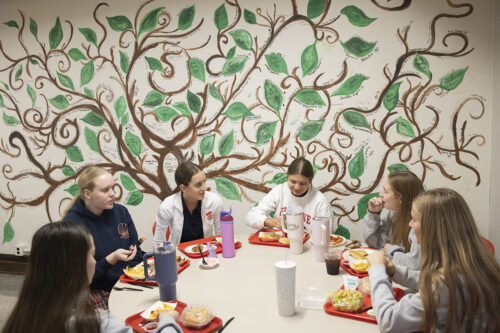Catholic schools reevaluate cellphone policies in light of statewide ban

Some schools have implemented schoolwide ban; others limit use throughout the school day
It’s midday in the cafeteria at Ursuline Academy. Clusters of students lean across tables, chatting away over their lunches. Others lounge at patio tables in the outdoor courtyard as they discuss their plans for the weekend.
What’s out of the picture here — their cellphones.
The all-girls high school in Oakland is one of several Catholic schools in the Archdiocese of St. Louis that this year have implemented a campuswide prohibition of cellphones from the beginning to the end of the school day, known as a “bell-to-bell” ban.
Most Catholic schools have policies that limit the use of phones and other personal devices, but a new statewide law banning cellphones and other personal electronic devices in public and charter schools, which took effect this school year, prompted some Catholic schools to reevaluate their policies, even though the law did not bind them.

Conversations among principals at several independent high schools, prompted by Jonathan Haidt’s book, “The Anxious Generation,” led to an exchange of ideas regarding their cellphone policies.
“We all want to educate the kids to use technology responsibly,” Ursuline principal Mark Michalski said. “And there was a time when we thought, ‘Okay, then let them use them, and we’ll correct them when we need to.’ I think we’ve just landed on the way that we can teach them to be most responsible is to say, this isn’t the time or place for it.”
The transition to a bell-to-bell ban was relatively smooth, Michalski said, because the school already had a policy limiting cellphone use. Several years ago, Ursuline implemented a full ban on cellphone use during retreats, which was met with some initial hesitancy but ultimately resulted in positive feedback from students.
“We’ve had a lot of that same response since we’ve done this throughout the school day,” Michalski said. “The hallways are louder — which is actually a real positive. There’s a couple of different groups of girls that hang out in this lobby area. And it used to be that they would hang out, but it wouldn’t be that loud. They would be on their phones, and now they’re just talking to one another, and it’s great.”
At least 31 states and the District of Columbia require public school districts to ban or restrict students’ use of cellphones in schools, according to an Education Week tracker. Other states have incentivized or recommended that local districts enact their own bans or restrictive policies.
After Missouri’s law was passed in July, the archdiocesan Office of Catholic Education and Formation sent a letter to Catholic school leaders encouraging them to look at it as a helpful resource in creating new policies or strengthening current ones.
“While we will not mandate any policy within the Archdiocese, the Office of Catholic Education encourages each school to adopt clear communication device policies that make sense for your school community; and align closely with the law’s expectations,” president Julie Scott Soffner wrote. “Thank you for keeping the well-being of every student at the heart of your school policies.”
Better productivity, connection
Students at Ursuline have reported feeling more focused at school and socially engaged with one another and teachers. Students are allowed to carry their devices during the school day but are expected to keep them out of sight at all times and silence notifications.
Before the ban, junior Molly Wilmes said that sometimes she’d push off doing schoolwork during study hall, instead opting to look at her phone.
“Now, not having my phone, I’m more productive,” she said.
The first few weeks of school took some adjustment, senior Ella Roberts said. She and other upperclasswomen helped freshmen navigate their way around school, and extra analog clocks were added to the hallways and classrooms to ensure students got to their classes on time.
“Once you get used to putting your phone away and being fully connected with your schoolwork, your peers and your teachers, it definitely helped,” Ella said. “I get all my work done and I don’t have as much homework when I get home.”
Senior Hayden Yorty said she’s seen an increase in face-to-face interaction among students, including branching out beyond close friends.
“When you’re all sitting in a big social setting, if you’re with people you aren’t super close with, you tend to just stare at your phone and let them all congregate together,” she said. “But without that, you engage in conversation better and talk to more people than you normally would.”
“A lot of good energy”
Other Catholic schools have continued measures to limit cellphone use throughout the school day. Students at Duchesne High School in St. Charles are not allowed to use cellphones during classroom time, but may use them during passing periods and at lunch. Like other schools, Duchesne has disciplinary measures in place for violations.

“We want to teach them appropriate use of technology rather than just saying no, no, no,” principal Kurt Schneider said. While some students will use their phones during lunchtime, Schneider said he often sees large groups huddled together having face-to-face conversations.
“In that setting, when they are open to using it, there’s a lot of good energy and you can just see the kids talking and laughing,” he said.
De Smet Jesuit High School in Creve Coeur implemented a policy in 2019 in which students deposit their phones into a pouch during classroom time. Phones are allowed during passing periods and at lunch.
“The research says when it is within so many feet of a student it is still a mental distraction,” principal Kevin Poelker said. “We wanted to ensure distance and accountability in the classrooms, so we use numbered pouches and take attendance from that.”
Administrators are considering whether to make further changes to the high school policy and have surveyed parents to get their feedback.
“Right now students can have phones during passing periods and can take them to lunch,” he said. “What we’re considering is should we restrict them at lunch, activity and homeroom periods, and if we do, how do we do that?”
De Smet’s middle school, which opened in August, has a different policy that requires students to turn in their phones during homeroom at the beginning of the school day and are returned to them at the end of the day.
“We felt that students’ ability to manage impulses at that age is not as strong as high schoolers, so we felt a different approach was warranted,” Poelker said. “We also wanted to increase their chances of getting to know each other better. We thought, if we did this, now was the time to do this from the beginning.”
St. Peter School in Kirkwood has had a longstanding policy in which students are expected to keep their phones and other personal devices away and turned off or silenced throughout the school day.
The majority of students have their own cellphones by eighth grade, principal John Freitag said. Studies show that the average age a child gets a first cellphone is about 12 years old.
Several years ago, the school hosted a book study with parents on “The Anxious Generation” to dive deeper into the cultural shift from a play-based childhood to one centered around technology.
“The negative effects of all of this, the socializing and the level of anxiety, stress, isolation, depression and ability to function socially and solve basic daily problems — it’s really compelling,” Freitag said. “Turning off notifications and creating phone-free time in your life other than when you’re sleep is important.”
Some schools have implemented schoolwide ban; others limit use throughout the school day
Subscribe to Read All St. Louis Review Stories
All readers receive 5 stories to read free per month. After that, readers will need to be logged in.
If you are currently receive the St. Louis Review at your home or office, please send your name and address (and subscriber id if you know it) to subscriptions@stlouisreview.com to get your login information.
If you are not currently a subscriber to the St. Louis Review, please contact subscriptions@stlouisreview.com for information on how to subscribe.







